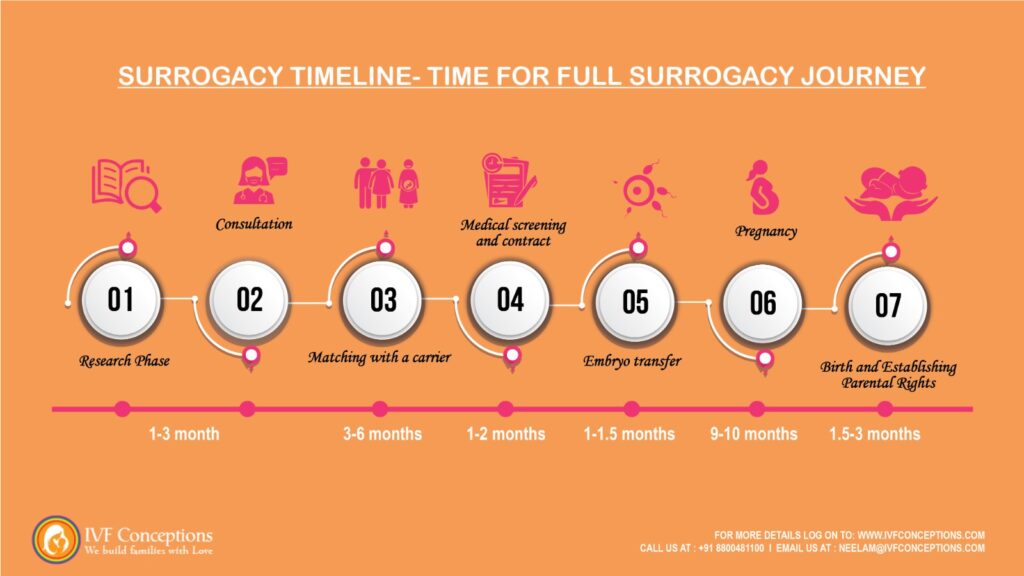Moving From Infertility To Surrogacy: 7 Questions To Ask

Shifting from Infertility Treatment to Surrogacy: Navigating the Transition
Moving From Infertility to Surrogacy is a life-changing decision for many intended parents who have faced years of emotional and financial struggles trying to conceive. While surrogacy may not provide the traditional pregnancy experience, it offers the opportunity to achieve parenthood and build the family you’ve always dreamed of.
Understanding the emotional journey from infertility to surrogacy, exploring surrogacy options for infertile couples, and working with trusted surrogacy professionals can help make the transition smoother. Contact a surrogacy expert today to determine if this path is the right choice for your family-building journey.
- Book an online appointment: Get a free online consultation.
- Call\W:+91-8800481100 Email:neelam@ivfconceptions.com
Speaking with your infertility counselor and a surrogacy specialist is the best way to assess if surrogacy after infertility is right for you. They can help you understand what to expect from the surrogacy process and whether you fit the standards for intended parents considering surrogacy.
More Resources to Read:
Surrogacy Guide for Surrogate Mothers
Surrogacy Guide for Intended Parents
How does the surrogacy process work
However, the decision to explore surrogacy following infertility is ultimately up to you and your spouse. Because this is such a personal decision, it’s critical to discuss it thoroughly with your partner to establish if it’s the best infertility treatment option for your case.
What is Infertility?
Infertility is a complicated problem that affects both men and women. Ovulation problems, fallopian tube blockage, endometriosis, and male factor infertility are among the causes that might contribute to infertility.
As a result, you are unable to birth your child on your own. Understanding the underlying reasons is critical for developing effective solutions.
Individuals and couples experiencing infertility can find hope through various fertility therapies.
- Fertility drugs like Clomid and Letrozole can induce ovulation.
- Intrauterine insemination (IUI) involves inserting specially prepared sperm directly into the uterus, whereas in vitro fertilization (IVF) allows fertilization to take place in a laboratory setting.
- Donor eggs or sperm may potentially be viable choices for people with severe reproductive problems.
- IVF (in vitro fertilization): In this procedure, eggs are extracted from the ovaries and fertilized in a laboratory using sperm. Embryos are subsequently transplanted into the uterus or preserved for later use. Many causes of infertility, such as blocked fallopian tubes, low sperm count, or genetic diseases, can be treated by IVF. If necessary, donor eggs, sperm, or embryos, as well as gestational carriers (surrogates and the surrogacy procedure), can be used.

7 Questions to Ask When Transitioning from Infertility to Surrogacy
While it is always necessary to consult with a medical professional to determine whether surrogacy is right for you, there are some questions you and your partner should ask yourselves if you are considering transitioning from infertility to surrogacy:
Q1. Have you discussed available options with your infertility counselor?
Discussing your medical alternatives with your infertility counselor is always a crucial part of the infertility process, especially if you’re considering surrogacy. Surrogacy may not be appropriate for everyone’s unique scenario. This is one of the most important steps to include for the intended parents
Before devoting time and energy to the surrogacy process, consult with a family-building professional to evaluate whether it is a viable choice for you and your spouse.
If you are feeling trapped with your present infertility alternatives and are looking for a fresh family-building procedure, a professional can provide the finest guidance. Refer to a surrogacy agency for further counseling
Q2. What do you prefer: parenthood or pregnancy?
One of the most difficult decisions intending parents face when deciding to explore surrogacy is giving up the possibility of carrying their child to term themselves.
Many intended moms have long fantasized about becoming pregnant, and it can be difficult to let go of that fantasy. It is nonetheless, critical to having a good surrogacy experience.
Intended parents who choose surrogacy do so because they understand what is truly essential to them: being parents. They are more willing to accept the surrogacy process once they know that being pregnant is not the goal, but having a child is.
However, you may not be ready to transition from infertility to surrogacy if you are not ready to let go of your desire to be pregnant and the unpleasant emotions that come with it.
Q3. Are you willing to let someone else carry your baby?
Similarly, as you let go of the desire to be pregnant, you must also be content with abandoning control over your baby’s development in utero. Surrogacy is a personal connection between intended parents and surrogates, and you must be prepared for that bond before beginning the surrogacy process.
This is one of the most important issues for intending parents (particularly intended mothers). It should give you some peace of mind to know that all surrogates are thoroughly screened to ensure that they are physically and mentally prepared for the obligations of surrogacy.
You will also sign a legal contract with the surrogate outlining your expectations for her while she is carrying your child. Still, you must be willing to put your trust in your surrogate and be able to deal with any envy that may occur during the surrogacy procedure. The surrogacy agency will help you out with all these procedures

Q4. Are you and your partner agreeing on surrogacy?
Before beginning the surrogacy procedure, you and your partner should openly express your views about it. It may be beneficial to include your fertility therapist to have the most fruitful conversation possible.
Before proceeding with the surrogacy process, both you and your spouse must be equally dedicated to the family-building process.
Surrogacy necessitates an emotional investment, so if you and your spouse are not equally eager and prepared for it, you will most certainly face some difficulties along the way, such as feelings of resentment, rage, and disappointment. the whole process of surrogacy is addressed at surrogacy agencies.
Q5. Have you considered the requirements for surrogacy?
Make sure you satisfy the requirements for surrogacy set by a surrogacy professional and chat with them about their surrogacy procedure. After speaking with a surrogacy specialist and your infertility counselor, you should be able to better decide whether surrogacy is a viable option for your situation.
Finally, before considering surrogacy, you and your spouse should conduct as much research as possible to establish whether it is truly suitable for you. Surrogacy is a complicated process, and you must understand what it will entail before committing to a year or more of it. your surrogacy agency will provide you with all the necessary details.
Q6. Are you ready to stop other infertility treatments?
Many intending parents who consider surrogacy after infertility have previously gone through years of unsuccessful reproductive treatments.
They’ve already spent thousands of dollars on assisted reproductive technology, such as IVF, that hasn’t resulted in their pregnancy.
They are thinking about surrogacy after infertility because the treatments they are currently doing are useless and will not work in the future.
If this is your scenario, surrogacy may be the next step for you. However, you should be prepared to move on from these other infertility therapies and realize that they will not yield the desired results.
If you are still hoping that IVF will result in a pregnancy, you may not be ready to transition from infertility to surrogacy just yet. Surrogacy does require a major investment of time, money, and energy, which should not be divided among multiple assisted reproductive technology options to be the most effective.
Q7. Do you have any embryos left over from your infertility treatments?
If you have leftover embryos and know that your past infertility treatments are unlikely to be successful, you may want to talk to your infertility counselor about surrogacy.
When intended parents decide to pursue surrogacy instead of infertility, they may have a few embryos left over from the in vitro fertilization treatment.
Because they know that implantation in the intended mother’s uterus will almost certainly fail again, they chose to use their last remaining chances to have a genetically related child in a more likely-to-succeed approach: surrogacy with a woman who has previously carried children.

Gestational Surrogacy: Personalized Journey
Surrogacy offers many hopeful parents an option to overcome numerous fertility issues. Surrogacy provides an opportunity to experience the joys of parenthood when traditional techniques are not practical, whether due to physical concerns, age-related issues, or same-sex relationships.
Surrogacy enables intended parents to have a child who is genetically linked to them, which can provide an amazing sense of pleasure and connection.
Surrogacy provides a highly personalized experience that is tailored to the intended parents’ specific needs, from selecting the ideal surrogate to establishing a strong emotional bond throughout the process.
Surrogacy ensures that every step is carefully planned to provide a positive and empowering journey for all parties involved.
the surrogacy process’s emotional, legal, and financial implications.
Additional guide for intended parents:
Best surrogacy agency in India
Best surrogacy agency in Mexico
Best surrogacy agency in Colombia
Best surrogacy agency in Argentina
Best surrogacy agency in Georgia
Conclusion
Remember that surrogacy is about more than just creating families; it is also about creating futures full of love, hope, and happiness. Accept the opportunities that surrogacy provides and embark on this life-changing journey.
If you are thinking about surrogacy or have any questions, you should seek advice from renowned professionals in the industry who can offer you the required knowledge and support. At last, I would like to say that if infertility is your problem, then surrogacy can be your treatment. Refer to a surrogacy agency now to overcome infertility.
If you’d like to learn more about IVF, Egg Donation, or surrogacy services globally, check out the rest of our website at Complete Surrogacy Agency. We offer legally secure and affordable surrogacy consulting services for FREE.
For more resources on IVF and Surrogacy, browse our other web page- IVF Conceptions.
For more resources on IVF and Surrogacy, browse our other web page- Georgia Surrogacy Agency.
Complete Surrogacy: Your Trusted Partner in International Surrogacy
At Complete Surrogacy, we have over 15 years of experience in international surrogacy, guiding 4,000+ intended parents worldwide. We provide safe, ethical, and affordable surrogacy solutions for single parents, LGBTQ+ couples, and heterosexual couples.
As members of EFS and ESHRE, we adhere to the highest ethical and professional standards. Our expert team is committed to providing accurate, compassionate, and transparent guidance, ensuring a legally secure and smooth journey to parenthood.
Let us help you build your family with trust, care, and integrity.
Get in touch for one FREE Surrogacy Consultancy!
Our team includes experts from diverse backgrounds with leading reproductive attorneys, professionally trained top fertility doctors, former surrogacy case managers, experienced and kind surrogate mother and egg donor coordinators, mental health professionals specializing in infertility counseling, and a logistic support team to assist you in your chosen surrogacy country.
FAQs for Moving From Infertility To Surrogacy
Q1. What are the legal consequences of surrogacy?
Ans. Surrogacy has different legal repercussions depending on where you live. To properly handle the legal issues of surrogacy, it is critical to contact legal practitioners who specialize in reproductive law.
Q2. Is surrogacy related to any health risks?
Ans. Surrogacy entails medical treatments as well as potential hazards. Surrogates are subjected to extensive medical examinations to reduce health hazards. Both parties must prioritize medical treatment and adhere to professional guidance.
Q3. How long does the normal surrogacy process take?
Ans. The surrogacy process can take a long time. It is determined by a variety of factors, including the time required to identify a suitable surrogate, medical procedures, legal processes, and personal situations.
Q4. How can I find low-cost surrogacy choices without sacrificing emotional support?
Ans. Finding cheap solutions requires researching trustworthy surrogacy firms and programs that provide transparent cost breakdowns. Investigate financial assistance programs, grants, and insurance coverage to help manage expenditures while keeping emotional support a priority.
Q5. What are some signs of surrogacy’s emotional readiness?
Ans. A thorough awareness of your motives, a strong support network, open communication with your partner, and a willingness to embrace the emotional hurdles that may occur are all signs of emotional preparation for surrogacy.
Recommended reads
- Gestational Surrogacy: What Is It, What to Expect, Laws & More
- I Didn’t Think Surrogacy Was for Me. And Then Life Happened

Author Bio: Neelam Chhagani is an International Surrogacy Expert with 15 years of experience in the fertility and surrogacy domain. As the founder of IVF Conceptions and Complete Surrogacy, she has guided over 4,000 intended parents worldwide on their surrogacy journey to parenthood. Recognized as a trusted authority, she specializes in holistic infertility solutions and third-party reproduction consulting.
Holding an MA in Counselling Psychology and a PGD in Mental Health, Neelam is a proud member of the European Fertility Society (EFS) and the European Society of Human Reproduction and Embryology (ESHRE). She is also a leading surrogacy blogger, providing valuable insights into ethical and practical surrogacy solutions.
Since 2010, committed to supporting ALL family types, Neelam has been passionate about helping intended parents grow their families with compassion, integrity, and a focus on secure and affordable surrogacy options Globally.
Learn more about Neelam:
https://www.ivfconceptions.com/neelam-chhagani-surrogacy-consultant/
https://www.linkedin.com/in/neelam-chhagani-92892229/















I was introduced to Neelam by a friend who worked with Neelam for surrogacy. Neelam is absolutely wonderful. I am a single male and the journey to fatherhood is not that easy. Neelam connected me to a program ideal for my circumstances. She was with me throughout the pregnancy providing advice and guidance along the way. I am so grateful I found her and am thrilled today that I have a beautiful daughter. I highly recommend Neelam to anyone who is on a journey to become a parent. Having a child has changed my world for the better. I wish others success with their own journey and recommend you connect with Neelam to find a path that is best for you.
SA (USA)